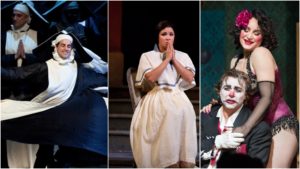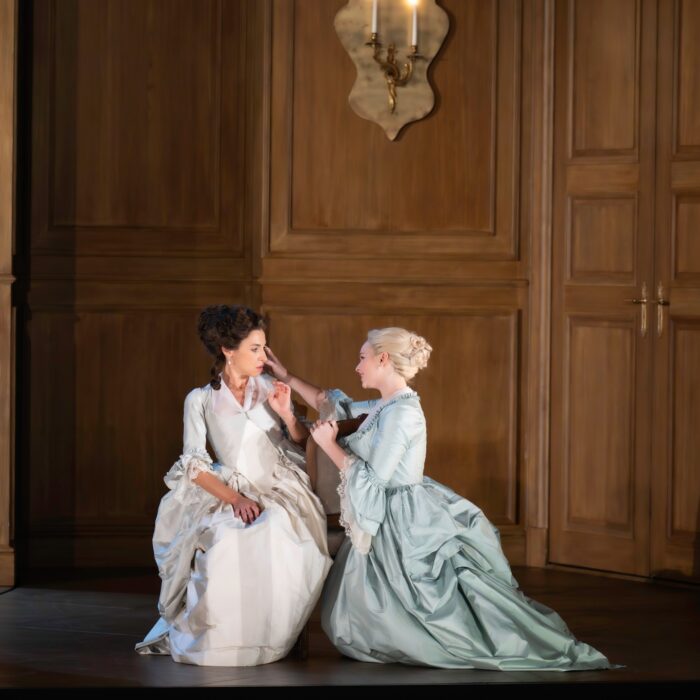
The Greatest Disguises in Opera
By David SalazarIt’s Halloween! Which means that most people are taking the opportunity to disguise themselves as someone else, live out a temporary existence as a character that they either dreamed of being or enjoy playing.
Opera is full of this kind of interplay, with characters disguising themselves or putting on literal costumes to get their way. One thing we often learn in opera about characters throwing on costumes is how much they truly reveal about who they are. In honor of this enjoyable holiday, we look at some of the greatest disguises and costumes in all of opera.
Leporello as Don Giovanni – “Don Giovanni”
One might argue that the titular character of Mozart’s masterwork deserves the spot of the best disguise in his own opera. But the truth is that the Don never really disguises himself, but instead hides his true self.
While he switches places with Leporello halfway through the opera, it is Leporello’s disguise as Don Giovanni that not only proves more dramatically poignant, but also provides one of the most hilarious operatic moments of all-time. Staged properly, Leporello feigning for Donna Elvira is both cruel and funny.
Norina as Sofronia – “Don Pasquale”
This also provides one of the great comedic moments in all of opera as the sly Norina goes through quite a few different guises in a span of minutes. She shows up as a chaste Sofronia and once married turns into an absolute monster of a woman that drives the titular character insane.
Count Almaviva As Lindoro, A Soldier, Don Alfonso – “Il Barbiere di Siviglia”
It seems that men in high places tend to be the aptest at taking on different disguises. As the rest of this list will show, the men who take on other personas tend to be Dukes, Counts, or even Kings. So it is fitting that the hero of Rossini’s “Il Barbiere di Siviglia” takes on not one costume or disguise, but three over the course of the opera. We all know that his lack of stable persona is a hint at his same marital instability in the story’s sequel, but in this work, he creates one hilarious circumstance after another.
Gustavo / Riccardo As the Fisherman – “Un Ballo in Maschera”
This disguise is far more subtle and rather brief when compared to some of the others as Gustavo / Riccardo shows up at Ulrica’s cave to spy on her. What we get from it is Verdi’s brilliant ability to showcase character through music as the tenor gets a passage that is rather at odds with his other music but also enlightens our ability to understand his jovial and playful manner. On a more subtle level, fishermen are often noted for their interchangeable nature established by their lifestyle. In this way, it emphasizes Riccardo / Gustavo’s own emotional instability at this point in the opera.
Duca di Mantua as Anything – “Rigoletto”
The bad Duke gets two major disguises in this opera, starting with the poor boy “Gaultier Maldé” that he uses to convince poor Gilda of their compatibility. Later in the opera, he appears yet again in another disguise, presumably of a similar nature to Gaultier, this time to win the heart of Maddalena. This ultimately saves his life and seals that of Gilda, who herself dresses up as a boy. His costumes emphasize his conniving quality, his identity as the poor student give a proper name, while his true identity relegated to his title.
Siegfried as Gunther – “Götterdämmerug”
At the start of the final work in Wagner’s famed tetralogy, Siegfried forgets his memory, falls for Gutrune and promises his new brother-in-law Gunther to get Brünhilde for him. So he puts on the tarnhelm, a literal mask that transforms him into Gunther so that he can easily secure the former Valkyrie for his soon-to-be brother.
Fafner as a Dragon – “Siegfried”
Fafner, like Siegfreid, gets to turn into whatever he wants thanks to the tarnhelm and he chooses to hide his giant form in that of a dragon. Of course, it does him little good when he encounter’s the opera’s hero, who ultimately kills him.
Wotan as the Wanderer – “Siegfried”
The first true disguise of the “Ring Cycle,” Wotan hides behind the guise of a random wanderer who plays riddle games with Mime, encounters Alberich, and then has a fateful tête a tête with his own grandson, which he loses.
Cherubino as a girl – “Le Nozze di Figaro”
Back to the world of comedy, Cherubino’s disguise as a girl gets its own aria and incredible payoff as the character disappears for a bit only to reappear in the disguise we never fully got to see. It also plays cleverly with the whole identity crisis of the young boy, played by a female singer, who now has to pretend to be a woman.
Ferrando and Guglielmo as Turks – “Così fan tutte”
Perhaps the most famous of all disguises in opera, the two men in Mozart’s third Da Ponte opera leave their lovers and return to win them over, as Turks. It creates some rather humorous situations early on but then has the characters ultimately wondering about their own feelings in a moment of emotional crisis.
Le Comte Ory as a Female Pilgrim and Hermit – “Le Comte Ory”
Another count and this one, like the others on the list, likes to take on all the guises he can. Unfortunately for him, his first disguise as a fortune-telling hermit backfires on him as it pushes Countess Adele toward falling in love with his own page. But his second, and more hilarious disguise as a female pilgrim actually brings him closer to his goal and, in some productions, helps him obtain it.
Gianni Schicchi as Buoso – “Gianni Schicchi”
The titular character of Puccini’s famous comedy gets the lone distinction on this list of playing a dead man. And while undeniably sickening on some level, it is perhaps one of the most hilarious disguises ever put on an opera stage.
Everyone in “Pagliacci”
This opera is all about putting on costumes and assuming other personas. But what is perhaps more intriguing is how the opera analyzes that putting on costumes can be even more revealing about our true selves. Canio’s entire “Vesti la giubba” analyzes this aspect of having to hide yourself behind a costume, but Tonio’s opening monologue notes that the opera itself aims at a different purpose: “Now, then, you will see men love as in real life they love, and you will see true hatred and its bitter fruit. And you will hear shouts both of rage and grief and cynical laughter.”
Did we miss any? Let us know in the comments below!
Categories
Special Features

